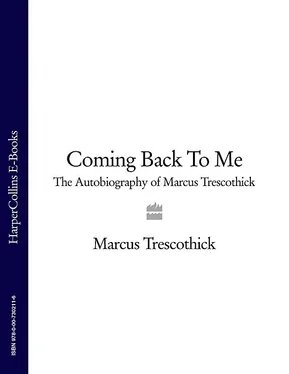what happens next and at this stage I’m not too sure, I want to drive it on from hereon in, but looking back to India, the first time, it was a really tough place and a tough situation to go through because I literally didn’t know what was happening. I genuinely thought I had an illness that was going to see me off and, not knowing, at that point what to do. After I came back it got worse for a while, then it got better, then it got worse again. You’re being followed by media people around your home town and they were waiting on your doorstep when you walk out the house. There were articles in papers, complete and utter rubbish, it’s just like where do you go? There was no hiding place for me and for two or three months when I came back then it was real hard work and something I never want to have to experience again because it was a real tough place to be and I didn’t really know what to do at that point, just taking advice really from people and colleagues and obviously counsellors to help get me through the situation. And it was really tough, you know. I’m such a better person for it, though. I’ve come through the other side. I’m sure I’ll never be clear of the whole process … at some point throughout my life at different stages, it may hit me again. Even now, I have the odd day when I relive memories and things and feelings that come back after a while, but I’m better equipped now to deal with situations and understand the beast that lives inside, and understand he’s going to come back and come knocking on your door again. You’ve just got to deal with that process and just keep riding the journey until eventually it dies down and you carry on living your life as normal. You know, I’m a better person, as I’ve said, and I’ve learned so much from the whole situation .
PH: In your heart of hearts, do you think you’ll play for England again ?
MT: I can’t honestly answer that question. All I know is that I’d love to have another go and I’m going to give myself every opportunity to have another crack at it. I think it’s going to take a lot more hard work the longer it goes, of course. The team has changed totally. You’ve got Peter Moores in charge. The lads in the team are totally different. In my heart I still want to have aspirations to have another go. I haven’t actually got to the point where I’ve admitted to myself that I can’t do it any more. So until I get to that stage I’ll keep trying .
A couple of weeks later, Peter rang me for a brief interview for his paper concerning the trip to Dubai. It is worth revisiting my response. ‘I won’t deny I am a little nervous about the prospect,’ I told him. ‘I don’t want to pre-empt anything, but I know the signs and how to work through them. I’m feeling well at the moment and things are pretty good, so I’m 95 per cent certain that the trip will be all right. It is a big step and I’m not taking anything for granted. It will be interesting to see what happens.’
Ninety-five per cent certain?
Yet, I actually felt strong enough to offer my help to the Australian fast bowler Shaun Tait, who had recently announced he was quitting all cricket indefinitely, citing physical and emotional exhaustion, and, overall, my level of contentment could be gauged by the fact that I had only met with my personal counsellor, with whom I had been in regular contact since I returned home in crisis from England’s 2006 tour to India, on two occasions since the previous July.
First, on 27 December 2007 we had reflected on the summer I had enjoyed with Somerset, discussed my future plans and a possible return to international cricket, the impending addition to my family and my benefit season. At the end of the meeting it was left up to me to make contact if I felt I needed to, and apart from the occasional text message of reassurance that I was doing okay, I hadn’t. Closer to the time when I was due to leave for Dubai I rang him to say we must chat about this before I went and we did, at Somerset’s home ground in Taunton, where I told him: ‘It looks good. I’m looking forward to it. It’s fine.’ We arranged that I would ring him early on the day of departure, for a final check on how I was.
That morning I went over the plan one more time; first I would pack for the journey, then I would ring my counsellor. Next I would take Hayley and the girls out for lunch before they dropped me off at the ground in time for me to catch the bus along with the other lads, ready for a 3 p.m. departure to Heathrow.
Prior to my troubles, one of the aspects of touring I had enjoyed most had been packing. Ever since I can remember I had been a ‘kit bully’. As a kid, growing up in a cricket-mad household, with a playing dad, Martyn, who represented Somerset 2nd XI, and a tea-making mum, Linda, I had loved poring over the magazines advertising cricket equipment. I had loved the physical sensation of unwrapping and trying on new pads, gloves, sweaters, boots, anything to do with the game of cricket. And bats. I just loved bats. This time I had laid out my kit, meticulously, and the act of placing it in my ‘coffin’, all in the correct order, was almost meditative.
After lunch, we set off for the ground and it was there, around 2 p.m., out of a clear blue spring sky, it all started to go wrong again.
Hayley had driven to the ground with the kids in the back of the car. When the time came, I kissed them all goodbye and as the car pulled away, I was suddenly, acutely and terrifyingly aware of the shiver. Straight away, I understood. If it hadn’t meant so much to me to at least try, I might even have told the lads there and then that they had better go without me.
‘Oh, no.’ I said to myself. ‘Oh, no.’ Then, before I could close my mind to it, an image appeared of Ellie, back at home, asking Hayley ‘where’s daddy?’ and the look of sadness as she understood I wasn’t there. That sadness swept over me. The thing I had feared most was happening and, if my previous experiences were anything to go by, the process was as unstoppable as a domino chain.
I still hoped I might be able to stop it taking over completely, as it had done so many times before. I started to try and fight it and the feeling subsided as the usual cricketing banter began. ‘Maybe this time, maybe this time I’ll beat it.’
I boarded the bus and started to calm down and, as we set off, I realized something had slipped my mind, namely the prearranged morning phone call to my counsellor and that realization temporarily buoyed my spirits. I started thinking to myself that the fact I had forgotten to make the call was a great sign. I rang him on my mobile and told him: ‘I forgot to call you. We’re on the coach. On our way to Heathrow.’ I sat there afterwards, attempting to persuade myself that if I hadn’t been worried enough about the trip to have made the call to my counsellor, I must actually be okay to go. Except that, for the rest of the coach journey I was wavering between that hope and a growing sense of unease.
I don’t know whether any of the other guys could sense what was happening. James Hildreth certainly can’t have done. Somewhere around 500 yards away from and in sight of the terminal he started taking the mickey big-time. ‘Getting nervous, Bang?’, ‘Excuse me, driver, this is as far as Mr Trescothick is going,’ etc. I was used to it. I got heaps of that sort of stuff anyway from guys like Andy Caddick, my former England colleague, Steffan Jones and Jason Kerr, the two best men at my wedding to Hayley in January 2004 – normal stuff that I had been more than happy to take inside the dressing-room at Somerset for some time. Madfish, they used to call me, after Madfish Willie, a character in the gangster film Snatch. And I never minded the name-calling for a second because to me if people felt okay about taking the mick out of me, they must have reckoned I was okay enough to have it taken. Unfortunately, however, by now I was struggling badly, though they had no way of knowing as the illness had made me an expert at hiding my true feelings.
Читать дальше












